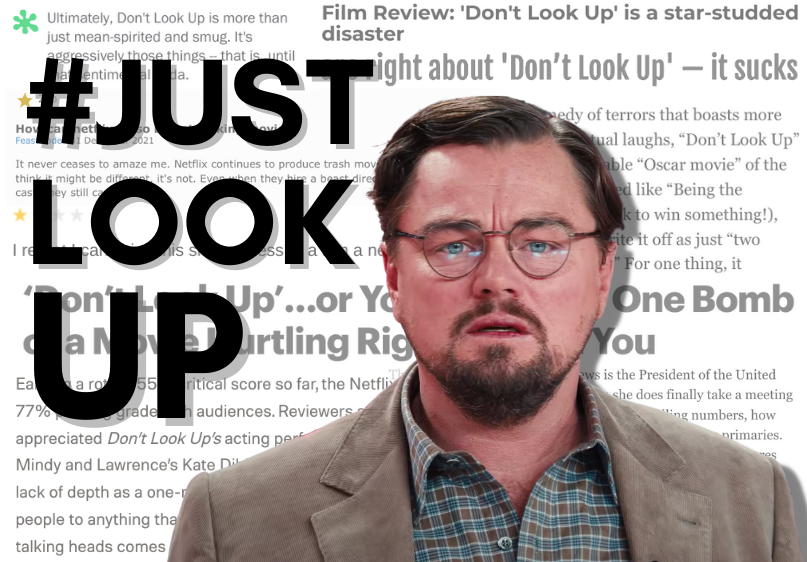#justlookup
How the film community missed the message of “Don’t Look Up”
Staff Graphic by Maddie Policastro
“Don’t Look Up” receives scathing reviews from critics and film-goers alike shifting the focus away from the movie’s important message (original photo adapted from Netflix).
Adam McKay’s latest directorial endeavor, Don’t Look Up, has certainly raised a couple of eyebrows from so-called movie fanatics. Released in 2021, the satirical comedy-drama has garnered a great deal of attention for its recent Oscar nominations, yet it appears to be for all the wrong reasons.
From the promise of a star-studded cast featuring big names like Leonardo DiCaprio and Jennifer Lawrence to the rather humorous nature of the movie’s marketing campaign, many were racing to tune in to a feel-good family film. What viewers received, however, was much different. Over the course of the movie’s two-hour and twenty-five-minute run time, Don’t Look Up depicted the terrifying reality of what our world will become if we don’t open our eyes to climate change.
Though the climate crisis has certainly been discussed in various other films, none have been as on the nose as Don’t Look Up. With the film concluding in the total destruction of the world as we know it, many felt the movie was much too bleak. Complaints and poor reviews flooded in from every direction with many critics claiming that movies about climate change must deliver the message in a more soothing manner in order to not upset viewers. What many fail to recognize, however, is that the film was not simply made for the viewers’ amusement. If you were at all scared, uncomfortable or upset while viewing this movie, good – that was the whole point.
Climate change is a topic that has been sugar-coated for years. Young children are raised with the mentality that the climate crisis is a problem they must work towards fixing in the future, yet climate change has proven to be an ever-impending threat that must be tackled in the present. Today, loss of sea ice, accelerated rising sea levels and longer, more intense heat waves are all ever-present effects of climate change. Unfortunately, these occurrences were all predicted by scientists some years ago, yet little was done to actually stop them from happening.
Just as we have continued to do with climate change, many characters in Don’t Look Up refused to believe that a comet hurtling rapidly towards earth had the power to destroy the planet. Even as scientists called for everyone to “just look up” and see the comet for themselves, many continued to deny these seemingly absurd claims which inevitably lead to their downfall. In this way, Don’t Look Up truly emphasizes the importance of listening to science and working towards change while we still have the time.
With all of this in mind, it is okay to dislike this movie. Critics are justified in their dissatisfaction with the film’s editing or the strange comedic elements of the movie. Films that convey important topics can always be poorly made and it is perfectly fine to point that out just as long as one’s dislike for the more aesthetic aspects of Don’t Look Up is not the only thing they take away from the movie. Viewers must recognize that this film was made with the intention of opening the discourse on climate change as well as highlighting why it needs to be taken seriously.
This topic is much more important than whether the film is truly Oscar-worthy. At the end of the day, Don’t Look Up is a call to action that many have chosen to ignore – likely out of fear. If we continue to follow down this same path, we will most definitely find ourselves in the same irreversible predicament as those in the film.





